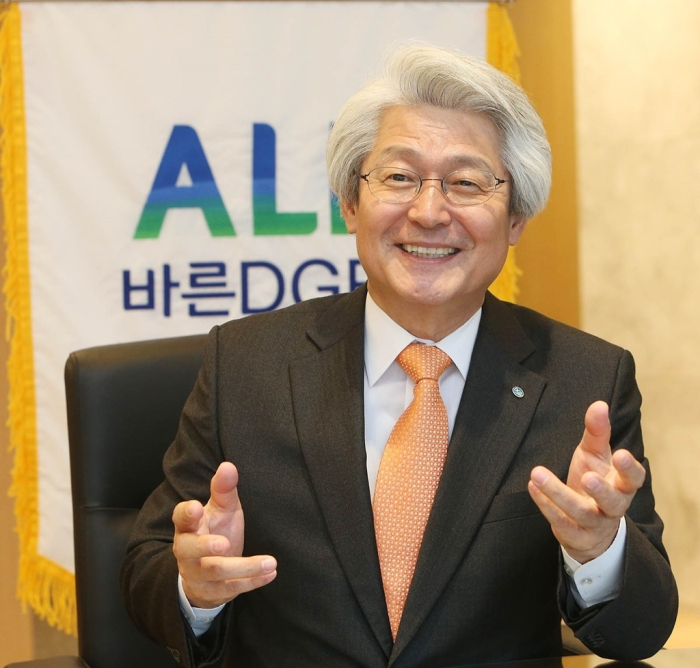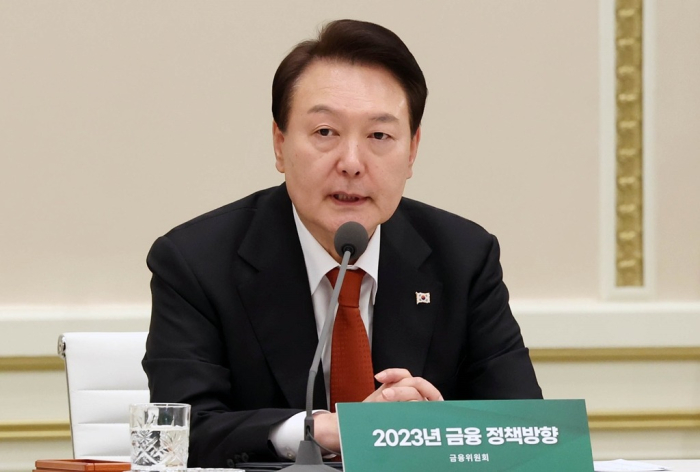Business & Politics
Govenment calls end to Korean financial group heads' long-serving posts
The FSC unveils guidelines to contain financial group CEOs’ term extensions; industry is concerned over excessive intervention
By Jan 29, 2024 (Gmt+09:00)
3
Min read
Most Read
LG Chem to sell water filter business to Glenwood PE for $692 million


KT&G eyes overseas M&A after rejecting activist fund's offer


Mirae Asset to be named Korea Post’s core real estate fund operator


StockX in merger talks with Naver’s online reseller Kream


Meritz backs half of ex-manager’s $210 mn hedge fund



South Korean financial group chiefs will no longer enjoy automatic term extensions as the government is stepping up pressure on the groups to improve corporate governance with transparent processes on their CEO appointments.
DGB Financial Group CEO Kim Tae-oh on Jan. 12 decided to step down instead of extending his service to a third straight term. The decision came after Woori Financial Group's former Chairman & CEO Sohn Tae-Seung and KB Financial Group's ex-Chairman & CEO Yoon Jong Kyoo, who had been expected to extend their terms, resigned in January and August last year, respectively. In December 2022, Shinhan Financial Group CEO Cho Yong-byoung retired from his post.
Their resignations marked the end of the era of long-serving CEOs at South Korean financial groups, which do not have controlling shareholders, although some industry sources criticized the government as influencing the terms of private companies’ heads.
CEOs of five local financial groups – KB, Shinhan, Woori, NongHyup Financial Group Inc. and BNK Financial Group Inc. – out of eight have been replaced since South Korean President Yoon Suk Yeol took office in May 2022.
Given DGB CEO Kim’s decision, none of the financial holding companies’ chiefs extended their terms since Yoon’s inauguration. Hana Financial Group Chairman & CEO Ham Young-joo and JB Financial Group CEO and Chairman Kim Ki Hong are scheduled to serve their terms until March 2024.
DECADE-LONG TERMS
That compared with previous financial groups’ heads. Former Haha Chairman and CEO Kim Jung-tai served 10 years in four consecutive terms, while ex-KB chief Yoon and former Shinhan CEO Ra Eung-chan stayed in their positions for nine years each.
Such long terms stoked criticisms that chairperson extended their terms through symbiotic relationships with external directors or appointed their close aids as their successors.
“Financial holding companies have a structure that allows chairmen and external directors to extend their terms,” said a former external director of a financial group. “Chairpeople took their second terms for granted and regarded third terms as optional thanks to external directors.”
POTENTIAL ETHICAL RISKS
President Yoon Suk Yeol put a brake on such practices.
“Distributed ownership enterprises may face ethical risks in the composition of corporate governance such as the CEO appointments, so their procedures and methods must be fair and transparent,” he said in a meeting with the Financial Services Commission (FSC) in January 2023.

The regulator unveiled guidelines, which include starting the succession process at least three months before the CEO’s resignation and disclosing the succession process and candidate evaluation criteria.
Financial Supervisory Service Governor Lee Bokhyun stepped up the pressure.
“Financial groups should not build up an environment favorable for current CEOs to serve consecutive terms,” Lee told the heads of financial holding companies’ boards of directors.
The move was expected to reduce the side effects of long-serving CEOs, who rule various financial services including banking, insurance and credit cards.
The local financial industry is concerned over the growing influence of authorities, given the replacement of all financial group chairs, although the government has not appointed or preferred specific candidates.
The FSC’s guidelines are excessive intervention in private companies, some financial industry sources said.
“External directors did not play a proper role to hold CEOs in check, giving the government room to intervene,” said a former head of a local bank. “The board system, including the appointment and operation of external directors, should be reviewed first."
Write to Bo-Hyung Kim at kbh21c@hankyung.com
Jongwoo Cheon edited this article.
More to Read
-
 Banking & FinanceWoori Financial to bolster private banking service: chairman
Banking & FinanceWoori Financial to bolster private banking service: chairmanJan 18, 2024 (Gmt+09:00)
2 Min read -
 Banking & FinanceKB Financial Vice Chairman Yang named sole chairman candidate
Banking & FinanceKB Financial Vice Chairman Yang named sole chairman candidateSep 08, 2023 (Gmt+09:00)
1 Min read -
 Shareholder activismISS supports Shinhan Financial Group chairman nominee
Shareholder activismISS supports Shinhan Financial Group chairman nomineeMar 10, 2023 (Gmt+09:00)
2 Min read
Comment 0
LOG IN


